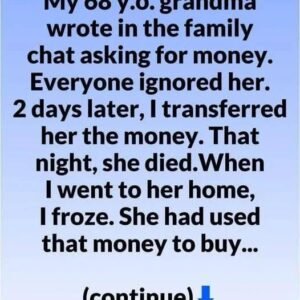My father didn’t yell. He didn’t explain. He didn’t even apologize.
He simply sat, staring at the broken pieces as if they reflected something within himself that he couldn’t face. This silence was not new to me. It had settled over our home years earlier, after my mother passed away.
Once, our house had been filled with conversation, laughter, and warmth. But after her absence, silence became the unspoken rule. My father retreated into himself, and I, too young to fully understand, learned to live within that void.
I used to linger at the breakfast table, waiting for a simple “good luck today” or “how was school?” I returned home from competitions with stories ready to share, hoping he might ask. But more often than not, silence greeted me instead. On graduation day, as the pieces of my shattered trophy glimmered at our feet, that silence became unbearable.
Unspoken Grief
I finally gathered the courage to speak. “You know,” I began quietly, “I didn’t do all this just for me. Mom always said—”
But he cut me off sharply.
“Don’t. Don’t bring her into this.”
His voice cracked like a whip, but behind the harshness was something else—an ache he couldn’t name. I froze, torn between anger and sorrow.
How could I not bring her into it? My mother had been the one to push me toward every opportunity, the one who encouraged me to dream bigger, to never settle. She celebrated every achievement, no matter how small, and constantly reminded me that I was capable of more.
“She wanted this for me,” I whispered, my voice trembling. “She wanted you to want this for me too.”
For the first time in years, my father really looked at me. His eyes softened, and I could see exhaustion hiding behind the hardness.
It wasn’t anger fueling his distance—it was grief. “I’m trying, Sophie,” he finally said, his voice barely audible. “But it’s hard.”
Cracks in the Armor
That small admission startled me.
My father was never one to reveal his feelings. Vulnerability was a language he didn’t speak. Hearing him confess his struggle didn’t erase the pain of what had just happened, but it cracked the heavy armor he had built around himself.
For the first time, I saw him not as the stern, silent man who withheld approval, but as someone drowning in sorrow he didn’t know how to express. “I know it’s hard,” I said softly. “But I’m not giving up on us.
I want us to be okay again. Can we try?”
He gave a slow, hesitant nod. It wasn’t a full reconciliation.
It wasn’t healing overnight. But it was a beginning. Picking Up the Pieces
Later that evening, I walked down the hallway and saw the remnants of my trophy scattered across the floor.
I knelt and began gathering them, careful not to cut my hands on the sharp edges. As I placed the fragments on my dresser, I realized something important. The trophy itself could be replaced, but my relationship with my father could not.
What was broken between us wasn’t permanent—it simply required patience, effort, and time to repair. Those fragments became a reminder to me: healing often begins with brokenness. Lessons Hidden in the Silence
That day taught me lessons I could never have learned from a textbook or award ceremony.
Grief Changes People – My father’s silence wasn’t truly about me. It was the shadow of my mother’s absence. His inability to celebrate wasn’t rejection—it was a wound that hadn’t healed.
Success Is Empty Without Connection – Recognition means little if it cannot be shared with those we love. I learned that joy grows when it is acknowledged and multiplied by others. Vulnerability Opens Doors – His quiet admission, “I’m trying,” was the first fragile step toward mending our bond.
Relationships Can Be Rebuilt – Like the broken trophy, our connection wasn’t destroyed beyond repair. It just required time and care to piece back together. A Story Beyond My Family
Though this story is mine, I know it resonates with many.
Families all over the world wrestle with unspoken emotions, unacknowledged grief, and the yearning for approval. Children crave pride from their parents, while parents struggle silently with their own battles. Silence can feel easier than confrontation, but it creates distance.
Learning to speak—to express pride, grief, or even vulnerability—is the key to healing relationships. Moving Forward
My father and I are still learning. Some days, silence returns, heavy and suffocating.
Other days, it breaks just enough for us to share a laugh or a brief conversation. But those small moments matter. They are proof that even after years of distance, bridges can still be rebuilt.
Now, when I think back to the broken trophy, I no longer feel only pain. I see it as the turning point in our relationship—the day we stopped pretending everything was fine and finally faced our grief together. Because life is not about trophies, medals, or accolades.
It’s about the people who stand beside us, even imperfectly. It’s about the courage to rebuild, even when everything feels shattered. Conclusion
My graduation day didn’t unfold as I had imagined.
Instead of pure joy, I was handed a painful but invaluable truth: success means little without love and connection. Yet, within that painful moment was also the seed of hope. A broken trophy became the start of rebuilding a fragile but real bond with my father.
And in the end, that is the kind of achievement worth fighting for.





